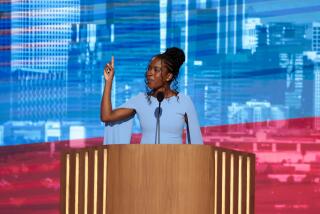Four-line poem sparks one big fuss
Aside from the day they are named and the day they die, poet laureates are not standard front-page fodder. But this week, British Poet Laureate Andrew Motion led the news in the U.K. with a 30-word poem that calls into question the motives of American and British leaders, particularly President Bush, for the anticipated war against Iraq.
Titled “Causa Belli,” Latin for “causes, motives or pretexts of war,” the poem appeared exclusively on the front page of Thursday’s edition of “The Guardian.” Above the fold, no less.
“They read good books, and quote, but never learn
a language other than the scream of rocket-burn.
Our straighter talk is drowned but ironclad:
Elections, money, empire, oil and Dad.”
Many literary insiders are calling Motion’s decision, not just to write the poem but to publish it in a newspaper, historic. Although poet laureates are traditionally appointed by political leaders, or in Motion’s case, sovereigns, their work is rarely so politically pointed.
Motion’s verse is not without precedent. In the wake of the Crimean War, Alfred Lord Tennyson wrote “The Charge of the Light Brigade,” which while stirring in its praise of military heroism even in the face of insurmountable odds makes it clear that the sacrifice was not absolutely necessary and “ ... the soldier knew/someone had blundered.”
“This is an historic event in two senses,” said one prominent literary editor who did not want to be named because of his long association with Motion. “It is certainly the first instance in modern times in which a poet laureate has come out with such a poem on a public issue. Most of the time, laureates simply celebrate royal birthdays and marriages. So, a lot of people will welcome this as another overly genteel British convention falling and be glad.”
That said, he added, “I really don’t think very much of the poem. It assumes a bitter superiority that is neither earned nor justified by the actual lines of the poem.”
Former U.S. Poet Laureate Robert Pinsky agrees. “Exactly who is ‘they’ in that first line?” he wondered. “It seems to me an unlikely poem to stir up much controversy, since up until the fourth line, it’s hard to follow.”
Still, he finds the fact of the poem unremarkable. “I never studied the history of the office [but] it never occurred to me that having the title meant I shouldn’t say this or that. I don’t think any self-respecting poet here or in England would take the title if he thought that.”
Named poet laureate in 1999, Motion is a professor of creative writing at the University of East Anglia in Norwich, England, and has written several biographies -- on Philip Larkin and Keats among others -- as well as numerous collections of poetry.
This poem, Motion told the Guardian, was a plea for clarity, rather than a literary attempt at policy-making. “I do believe that, if there are weapons of mass destruction discovered in Iraq, something needs to be done. [But] we can’t decide that because we don’t yet know whether there are weapons. It’s a poem about wishing to be more candid.”
He is not at all worried about a rebuke from the queen and if weapons are discovered in Iraq; he said, “I may well write a poem supporting going.”
More to Read
Sign up for our Book Club newsletter
Get the latest news, events and more from the Los Angeles Times Book Club, and help us get L.A. reading and talking.
You may occasionally receive promotional content from the Los Angeles Times.







